Words
with Wings (continued b)
(in 3 parts: (a)
continued
b,
continued
c
)
Prasanthi
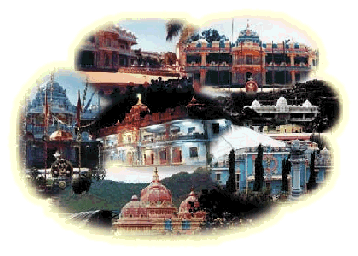 It
is always richly rewarding to delve into the
significance of the names that Baba sometimes
gives to people or things. His residence at
Puttaparthi, constructed in 1948-50, was named
Prasanthi
Nilayam
(the
Abode of Supreme
Peace).
All beings have to obtain it, sometime,
somewhere; each has to build it for himself with
His guidance and grace. Baba has cautioned the
humanitarians and the philanthropists of this
era that people today do not yearn for toys and
trinkets which feed avid appetites; they yearn
rather for the glory of God, peace on earth and
goodwill among men. They need calm contentment
rather than loud sensationalism. W.M. Dixon said
in his Gifford Lectures, "In the new Garden of
Eden, there will be good roads and water supply,
unlimited picture houses, unstinted soft drinks,
excellent sanitation, humane slaughtering, and
the best of schools, wireless installations,
free concerts and lectures for all. There will
be no far horizon and invincible hopes. We shall
cease to think of birth and death, of the
Infinite, of God, and the sublime secrets of the
universe. I am not much in love with these
sixpenny Utopias." Baba has been insisting that
those who draw five-year plans for dams,
powerhouses, railway lines and factories must
also provide adequate correctives for the
devastation of traditional values which will
follow the vast accession of pettiness and
profit. People intoxicated with sudden
prosperity and disheartened at the loss of
traditions need
Prasanthi
and
Prema
to confer courage and equanimity.
It
is always richly rewarding to delve into the
significance of the names that Baba sometimes
gives to people or things. His residence at
Puttaparthi, constructed in 1948-50, was named
Prasanthi
Nilayam
(the
Abode of Supreme
Peace).
All beings have to obtain it, sometime,
somewhere; each has to build it for himself with
His guidance and grace. Baba has cautioned the
humanitarians and the philanthropists of this
era that people today do not yearn for toys and
trinkets which feed avid appetites; they yearn
rather for the glory of God, peace on earth and
goodwill among men. They need calm contentment
rather than loud sensationalism. W.M. Dixon said
in his Gifford Lectures, "In the new Garden of
Eden, there will be good roads and water supply,
unlimited picture houses, unstinted soft drinks,
excellent sanitation, humane slaughtering, and
the best of schools, wireless installations,
free concerts and lectures for all. There will
be no far horizon and invincible hopes. We shall
cease to think of birth and death, of the
Infinite, of God, and the sublime secrets of the
universe. I am not much in love with these
sixpenny Utopias." Baba has been insisting that
those who draw five-year plans for dams,
powerhouses, railway lines and factories must
also provide adequate correctives for the
devastation of traditional values which will
follow the vast accession of pettiness and
profit. People intoxicated with sudden
prosperity and disheartened at the loss of
traditions need
Prasanthi
and
Prema
to confer courage and equanimity.
Baba's book,
'Prasanthi
Vahini',
gives us the key to the treasure-house of that
peace which escapes understanding and defies
logic, namely Prasanthi,
which the Gîtâ calls the goal of
human endeavor.
Santhi
means 'peace'; 'pra', the prefix, means 'larger,
superior'.
Prasanthi
is
Santhi
unaffected by desire, greed, hatred or anger. It
is not curtailed by adversity or multiplied by
windfalls. Baba says that we must cultivate the
three virtues of
Viveka
(intelligence),
Vairagya
(detachment) and
Vichakshana
(discrimination) in order to equip ourselves
with Prasanthi.
He prescribes the
Viveka
Chudamani,
composed by Sankara,
as the text which can develop in us these three
virtues. Baba says,
"Like
children playing with dolls you, too, call
some beings elephants and others horses, some
friends and others enemies, and spend your
entire life in such make-believe. Once you
realise that without the spirit they are all
just the same inert substance, the notion of
'many' and the diversity of name and form,
both disappear and there can be no liking or
disliking any more... You laugh and weep,
love and hate, live in joy, sorrow, anger and
fascination, but all these varied reactions
do not make the objective world less
unreal."
Vairagya
gets a new meaning in
'Prasanthi
Vahini'.
Raga
means 'attachment' and
Vairagya
comes when you realise that the stone to which
you were attached is really God. The 'stoneness'
is like a veil cast by your ignorance upon what
is really of the same substance as you yourself.
The
Vairagya
that results from this illumination is lasting
and most sublime.
Eight
Disciplines
 Baba
has also commented favourably in this book on
the eight traditional stages of spiritual
education, but He has given each of them wider
and deeper meaning. The first discipline is
yama,
which includes non-violence, honesty, celibacy
and non-acceptance of gifts. Baba says,
"This
is the meaning usually given to this word. But I
would say that Yama is really the giving up of
attachment to the body and the
senses."
Baba
has also commented favourably in this book on
the eight traditional stages of spiritual
education, but He has given each of them wider
and deeper meaning. The first discipline is
yama,
which includes non-violence, honesty, celibacy
and non-acceptance of gifts. Baba says,
"This
is the meaning usually given to this word. But I
would say that Yama is really the giving up of
attachment to the body and the
senses."
The second
discipline is niyama,
which is described in
rajayoga
texts
as 'physical purity, mental exaltation,
austerity, steadfast study and the attitude of
surrender to God.' But Baba explains it in the
following manner: "niyama
is steady prema fixed on god, the Supreme
Oversoul, regardless of time, place and
circumstances."
Asana,
the next discipline, lays down the place, time
and postures for the
sadhaka
engaged in meditation, to help him gain
steadiness and stability. Baba has clarified it
with a simple formula: "The best posture is
udasina"
(the posture of full relaxation and complete
detachment). In the
Yoga Sutras,
Patanjali
recommends sthira
sukha
asanam
(a steady, comfortable style of sitting). Baba
writes, "I
am telling you the same thing in other words,
that the most effective asana is the one least
affected by the external world, and udasina
means
'unaffected.'
"
About
pranayam
Baba says, "In
yoga, this step is explained as breath control.
But the control of the vital airs is possible
only for those who are aware that the world is
an amalgam of truth and falsehood. The picture
of the universe in the mind's eye will be like
letters written long ago by lead pencils, now
hazy, indistinct, indecipherable and giving
impression half true and half false. Only a
person aware of this peculiarity of creation can
command the vital airs to obey his
will."
Baba also
elaborates upon and clarifies the fifth stage
called pratyahara,
or the withdrawal of the senses of perception
from the external world in order to free the
mind for uninterrupted meditation on the inner
one. How can this be done? The awareness that
the external world is born of
maya
and sustained by maya,
will provide the motive force to withdraw the
senses. According to Baba, no other achievement
can accomplish this task. So here, too, the
acquisition of wisdom is a vital
prerequisite.
Baba
continues,
"Patanjali
declared that when the chittha
is established in one thought, it is called
dharana.
I would say that dharana implies more than
mere negation of the multiple activity of the
chittha... Treat your chittha like a little
child; caress it into good ways, leading it
with tenderness. Gradually make it aware that
all that is 'seen' is illusion,
superimposition, make-believe. Remove its
fears with love reprimands and focus its
attention on the goal."
Dhyana,
the next stage, has a book for itself from the
pen of Baba. Suffice it here to say that He
reveals to us that dhyana
is an
uninterrupted dwelling of the consciousness
within the consciousness itself. And the final
stage of samadhi
- the savikalpa,
where there is but a trace of the knower, the
to-be-known and the knowledge, and the
nirvikalpa,
where even this trace is effaced - is like the
ocean, into which the consciousness finally
merges. That is the goal where supreme peace
reigns.
[See
also Prasnottara Vahini, Chapter
15]
For the people
of the world today,
Prasanthi
Nilayam
has become a place where they can bask in the
warmth of such a peace. On Christmas Day, when
mankind celebrates the advent of the Son of God
to establish 'peace on earth and goodwill among
men', hundreds of Christians from overseas
gather at Prasanthi Nilayam to share with fellow
Christians from India the presence of Baba, who
has come on that same divine mission and is
engaged in transforming man into an instrument
for fulfilling that mission. He has directed
every unit of the Sathya Sai Seva organisation
to close each session with the prayer,
Loka Samastha Sukhino
Bhavanthu
(May happiness and prosperity reign everywhere).
But He has also warned them,
"While
repeating the prayer, if you do think ill of
others or look down upon anyone, if you
cannot tolerate difference of dress,
language, faith or temperament, you can never
promote peace. Your hearts have become pits
of hatred, greed and jealousy. But from this
day on, while your tongues pray for peace,
let your hands be engaged in service and your
hearts dwell in love."
Prescriptions
for Peace
"Today,
quacks with new fangled ideas lay down rules
for dhyana," says Baba. Each one has his own
special prescription and claims that his
system can confer more benefit than that of
others. But none have themselves experienced
its sweetness or sanctity. That is the real
reason why dhyana has drawn on itself the
cynical laughter of many. My intention is to
instruct such people and guide them onto the
right path."
Baba goes on
to reveal in these words the origin of His book,
'Dhyana
Vahini':
"Even
the most potent drug will not cure when it is
only extolled in elaborate phrases at the
bedside of the patient. The drug must be
taken in and allowed to work its way into the
blood stream. Your reading what I write on
dhyana will not make it easier. The mind is a
mad pleasure-seeker, running after mirages
seen through the inefficient and, therefore,
deceptive senses of perception. The
multifarious desires that infect the mind
have to be quelled and the mind focussed on
Ananda only. Of course, when the mind is
enlightened that God is the highest Ananda,
it will itself turn to God. When knowledge is
accepted as the master and given charge of
the reins, when the mind is denied the food
that breeds depravity, when the senses are
tamed by firmness and faith, dhyana will
surely lead you to that Goal."
Baba
distinguishes between concentration,
contemplation and meditation. Concentration is
an unwavering determination in one's daily life,
in the realm of the senses, the feelings and the
intellect. Contemplation is achieved when the
senses withdraw for some time and attachment to
the objective world slackens.
"When
you have completely broken away from all
attachment, you enter a state of
meditation,"
says Baba.
Baba gives the
guidelines for meditation and mind control in
'Dhyana
Vahini'.
He says that dhyana
is a life-sustaining as
dhanya
(food). "The methods vary greatly," says Paul
Brunton, who has tried quite a few, "but they
generally consist of physical asceticism and
worldly renunciation, together with attempts to
induce a contemplative mood by disciplining,
during fixed periods, the confused drift of
thoughts and impressions which make up man's
inner existence." Baba explains the choice of
place, posture, timetable and the curriculum,
but lays greater stress on the compassion of the
Lord who responds to the prayer embodied as
dhyana.
Since God assumes, for the sake of the
sadhaka,
the name and form that he meditates on, Baba
assures us that dhyana
need never be a barter endeavor; the summit can
be reached by perseverance, for
He raises up to Himself the struggling and the
exhausted.
Baba warns us
against nine enemies that waylay the earnest
sadhaka.
Three of them are physical: adulterous urges,
greed to possess things or gain exclusive love
and the tendency to injure living beings; three
are verbal: delight in causing panic by false
alarm, speaking lies and spreading scandal; and
three are mental: craving for what belongs to
others, envy and cynicism. Baba directs that
meditation on the form be accompanied by an
unbroken absorption of the sweetness of the name
by which that form is identified. When the form
slips from attention, the name will soon bring
it back; when the name drops from awareness, the
form will restore it to the mind.
"Thus,
the constant presence of God in the
consciousness is
ensured,"
says Baba. [See also: Sai
Baba on meditation - jyoti
meditation]
Blossoms
of Bliss
Mention can be
made here of a small book, 'Dialogues with the
Divine', brought out by the Maharashtra Branch
of the Prashanthi Vidwanmahasabha,
an all-india academy of scholars and sadhakas
founded by Baba. "This work has," as Baba
writes, "blossomed out of the bliss that V.S.
Page has earned and enjoyed in his inner-self,"
when he sat at the feet of Sri Sathya Sai Baba
and questioned him with humility on various
problems arising out of his studies and
spiritual practices. Baba tells
him,
"Nothing
can be attained without ceaseless practice.
So every moment you should remember God and
be happy in the thought. Then only will you
be able to attain peace. Are we not at peace
when one thought ceases and another does not
arise? You have to wait for that gap, be at
one with that peace. Then that peace will
become continuous and lasting.
"Thoughts
ever rise and subside as ripples on the
surface of water. You have to look at the
mass of water, not merely at the ripples.
Similarly, the Atman ever dwells in peace;
but man fails to realise this, and remains
ever absorbed in the vacillations of the
mind. Nityavadhan (constant vigilance) is
needed to ignore the waves and watch the
water... Restlessness is but the rise and
fall of the wave on the ocean that you
are."
The next
Vahini to be published serially in the
Sanathana
Sarathi
was the 'Jnana
Vahini'
(Stream of Wisdom).
"Whenever
the gross and even the subtle are
transcended, when the intelligence is
clarified, when the self is free from
feelings, impulses and instincts, what
remains in the consciousness is the true self
only. The person, then, is one with the
eternal truth, the one beyond everything. He
becomes Brahman or Paramatman," says
Baba.
This awareness
is the acme of ananda. In the
Taittiriya
Upanishad
it is declared that "from ananda all this is
born, through ananda all this lives, in ananda
all this is merged, and in ananda all this
rests." The greater the awareness of
Paramatman
the more the ananda. Baba summarises the truth
in one sentence:
"Awareness
is life," and then goes on to reveal, "all
men are Divine like Myself; the only
difference is that they are yet unaware of
their divinity. They have come into this
karmic prison through the karmas of many
lives. I have taken to this mortal form out
of My own free will. They are bound to the
body while I am free of this
bondage."
Another of the
Vahinis is the 'Upanishad
Vahini',
a synoptic review of the ten principal
Upanishads, with a prologue and an epilogue on
the rare text called the
Brahmanubhava
Upanishad.
These Upanishads are esoteric and highly
cryptic, but they elucidate the highest truths
discernible to the intellect of man.
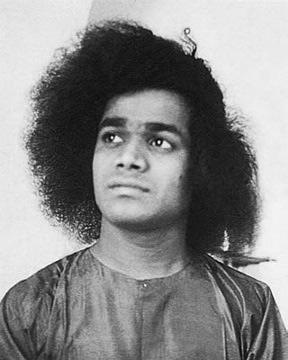 Baba
stopped short of the fifth form in high school,
when He was fourteen years of age. He did not
read books or learn from any teacher. He is
wisdom incarnate. He is poet, pundit, linguist,
educationalist, artist, mystic - the best in
each field. In His discourses He quotes freely
from the Bible, the Koran, the poems of the
Sufis, the dialogues of Socrates, the sayings of
Johnson, the dicta of Herbert Spencer, Kant and
Karl Marx, and from the myths and legends of
ancient cultures. He quotes from the Upanishads
and reveals new significances in the utterances
of the sages, to the astonishment of the savants
who have too long been content with arid
dialectics they have treasured.
Baba
stopped short of the fifth form in high school,
when He was fourteen years of age. He did not
read books or learn from any teacher. He is
wisdom incarnate. He is poet, pundit, linguist,
educationalist, artist, mystic - the best in
each field. In His discourses He quotes freely
from the Bible, the Koran, the poems of the
Sufis, the dialogues of Socrates, the sayings of
Johnson, the dicta of Herbert Spencer, Kant and
Karl Marx, and from the myths and legends of
ancient cultures. He quotes from the Upanishads
and reveals new significances in the utterances
of the sages, to the astonishment of the savants
who have too long been content with arid
dialectics they have treasured.
On fifteen
evenings Baba held a gathering of over five
thousand students and scholars at Brindavan
spellbound by His elegant and eloquent analysis
of the Vedic word, Brahman,
which means, as Baba writes in the
'Jnana
Vahini',
'big, enlarged, gross, high', since it comes
from the root 'brh'.
He carefully untied the knots which pegged that
portentous word to a cluster of irrelevancies
and misconceptions. He traced the genealogy of
the word from its roots to the tallest branch
and the tiniest twig. He ransacked without
compunction the nooks and corners of vedic texts
to expose the excrescences that had gathered on
that word as it rolled down the corridor of
time. On subsequent evenings, for another
fortnight, Baba spoke on another vedic word,
Bharat.
He elaborated upon the origin and migrations of
the word among peoples and through the texts.
Baba has declared more than once, that the
revival of vedic studies and research, with the
aim of reviving the practice of vedic ideals, is
one of His plans for rehabilitating
man.
The
Flow of the Upanishad
Baba,
therefore, decided on a small book on the
Upanishads, in order to rivet the attention of
the world to the efficacy of vedanta. As editor
of the magazine which published serially the
chapters of this book, I had an amazing
experience every month for a whole year. After
despatching the magazine on the 16th of the
month, I would go to Him for the next part of
the series. Announcing the name of the Upanishad
Himself, He would ask me to wait for a while in
His room and proceed along the veranda with a
notebook and pen, towards the room where there
stood a table with a chair by its side and
nothing else besides. Once, it was the turn of
the
Brihadaranyaka
Upanishad
to be summarised and simplified. It is the
biggest and the profoundest of the ten. I am
certain that Baba had never read it or consulted
others who could talk on it. And there was no
copy available anywhere within miles. But forty
minutes after he moved out with the pen and the
notebook as His sole possessions, I could
descend the eighteen steps from His room with a
ten-page dissertation on the truths this
Upanishad enshrined! I peeped into the script as
I walked towards the press and my eyes fell on
the Telugu words which said, "The grandeur of
the intellect of the Sage Yajnavalkya is
impressively evident in this Upanishad." I told
myself, "The grandeur of the omniscient teacher
that Baba is, is now impressively evident to
me."
Vedic
literature is classified as ritualistic,
consecrational and metaphysical
(karma,
upasana
and jnana),
and the Upanishads are grouped under the third
category. But Baba says that each principal
Upanishad deals with all the three and is,
therefore, instructive for all types of
sadhakas. Besides special rites described in
most of them, the adoration of preceptors or
deities is also recommended. Baba says,
"The
Upanishads enshrine the whisperings of God to
man."
About the ten on which Sankara and other
scholar-saints have written detailed
expositions, Baba says,
"Humanity
stands to gain or fall by these ten... They
are the synthesis of human thought,
experience and aspiration at their highest.
They confirm the possibility of human
perfectibility. They declare and demonstrate
that man can secure the awareness of God as
His reality if only he casts off the veil of
ignorance that he now delights to
wear."
Gita
Retold
Baba's
'Geetha
Vahini'
is the Bhagavad Gîtâ retold
in order to save modern man from the myopia of
egoistic materialism. He has declared that He
has come to unify and clarify, fructify and
fortify the holy aspirations of man. The doubts
and delusions which torment us while we are
engaged in the 'Battle
of Kurukshetra'
with our outer and inner kith and kin, are
treated here with love and sympathy by
Sai Krishna,
who also provides us with the
answers.
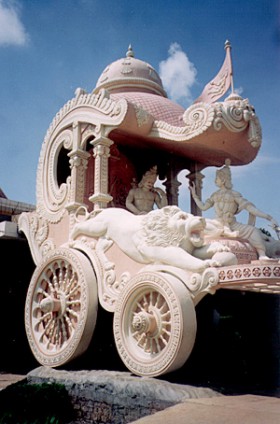 I
was once taken by an octogenarian pundit, a
professor of sanskrit and a retired inspector of
sanskrit schools in the state of Orissa, to the
Gita Mandir that he had built at Puri. He had
spent all his earnings on the construction of
this memorial. The temple is in the form of a
magnificent chariot, over twenty feet in height,
complete with wheels and horses. He had
explained to me, with a glint in his eye and a
tremor in his voice, the symbols he had got
carved around the chariot. The figures
represented various steps in
sadhana
and stages of spiritual achievement. There was
Hanuman
on the flag of the pole fixed atop the chariot.
And when we stood in front of the chariot. And
looked up, I could see two mysteriously real
statues seated upon it - the Lord, and His
disciple who was just awakening from his
self-inflicted stupor! It was a moment of thrill
for me. I had not expected such a satisfying
impact. I saw the disarming smile on the
countenance of the Lord when He recognised the
dawn of self-knowledge on the doubting and
dismay-ridden mind of His disciple.
I
was once taken by an octogenarian pundit, a
professor of sanskrit and a retired inspector of
sanskrit schools in the state of Orissa, to the
Gita Mandir that he had built at Puri. He had
spent all his earnings on the construction of
this memorial. The temple is in the form of a
magnificent chariot, over twenty feet in height,
complete with wheels and horses. He had
explained to me, with a glint in his eye and a
tremor in his voice, the symbols he had got
carved around the chariot. The figures
represented various steps in
sadhana
and stages of spiritual achievement. There was
Hanuman
on the flag of the pole fixed atop the chariot.
And when we stood in front of the chariot. And
looked up, I could see two mysteriously real
statues seated upon it - the Lord, and His
disciple who was just awakening from his
self-inflicted stupor! It was a moment of thrill
for me. I had not expected such a satisfying
impact. I saw the disarming smile on the
countenance of the Lord when He recognised the
dawn of self-knowledge on the doubting and
dismay-ridden mind of His disciple.
His hand
extended lovingly towards Arjuna as if He wished
to draw him closer to Himself, and on that hand
I could see, resting upon His palm, the book of
books - the 'Geetha
Vahini'
of
Bhagavan Sri Sathya Sai
Baba!
I saw
Sai Krishna
comforting, consoling and convincing Arjuna.
The pundit
knew that Baba's 'Geetha Vahini' was not
a resume or a commentary or an abridgement. It
was the voice of
Krishna
Himself, ringing over the clash of hate and
greed and calling us into more worthwhile
victories.
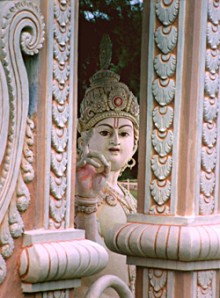
We are
encouraged in 'Geetha
Vahini'
to offer Baba the prayer He puts into the heart
of Arjuna: "As you are guiding this chariot,
guide me also and show me the way," for He is in
fact the charioteer installed in everybody. The
Gîtâ as expounded by Baba, is a
textbook of yoga
and a guide for sadhana.
It is a yogasastra
and brahmavidya
rolled into one. Through simile and story, sneer
and laughter, banter and reprimand, question and
counter-question, Baba pours into us the nectar
of wisdom.
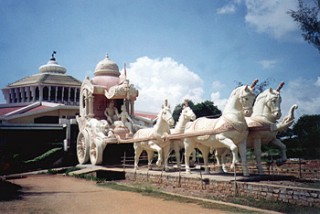
At
Kurukshetra, Krishna said that the mind and its
vagaries can be tamed by
abhyasa
(discipline) and vairagya
(detachment). In 'Geetha
Vahini'
Sai Krishna adds vichara
(discriminative reasoning). Baba also analyses
the concepts of kshetra,
yajna,
yoga
and maya
and sheds light on many corners which the lamps
of the ancient masters did not illumine. The
ideal of nishkama
karma
(selfless action) gets a glow of heroism when He
interprets it as a conscious refusal of the
fruits of activity, a courageous turning away
from both triumph and failure.
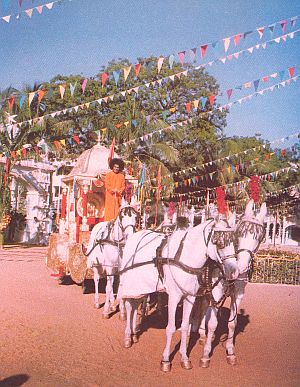
'the
Charioteer at Puttaparthi'
Self-Revelation
There are many
passages in 'Geetha
Vahini'
of self-revelation by Baba, where it becomes
difficult to determine who is speaking to us so
intimately - Krishna or Sai. "How can I ever
forget him who never forgets Me?" is the
question. "Forgetting is a human frailty. Let me
tell you: There is no need for
yoga
or tapas,
or even jnana.
I only ask you to fix your mind on Me, dedicate
it to Me. That is all I demand, and all that you
need to do."
This is the
promise of grace which all Arjunas can hope to
receive: Grace revives us when we are in great
pain and restlessness. It revives us when we
totter through the dark alleys of a meaningless
and empty life. It revives us when our disgust
for our own being, our indifference, our
weakness, our hostility and our total lack of
direction and composure have become intolerable.
It revives us when, year after year, the
longed-for perfection does not appear, when
stale compulsions reign within us as they have
done for decades, and when despair destroys all
happiness and courage. Sometimes, at that
moment, a wave of light breaks into our
darkness, like the voice which Tillich describes
in his book, 'The New Being' saying, 'You are
accepted.'
'Geetha
Vahini'
also condemns fanatic, blinkered gurus and
pompous exponents of the Gîtâ, whose
oratory sounds hollow because they do not
themselves practise what the Gîtâ
preaches.
The
Gîtâ is the central gem in the
crest-jewel of the great Indian epic, the
Mahâbhârata.
Sage
Vyâsa
wove this intricate tapestry of sublime heroism
- physical, mental, moral and spiritual. He had
also codified the vedic hymns and rituals. He
prepared a magnificent garland of aphorisms
summarising the basic philosophic truths. In
spite of his encyclopaedic scholarship and great
creative skill in the realm of thought,
Vyâsa was afflicted by a deep, inner
sadness. He had no sweetness or peace left in
him. [See Srîmad
Bhâgavatam, Canto 1 : 4 &
5]
Nârada,
the sage who propagated the validity of devotion
as a means of achieving bliss, had advised
Vyâsa to describe the glories of God who
had incarnated as
Krishna
[see
for example: SB, Canto
10]
.
The exposition that did emerge from this advice
is called the Bhâgavata
Purâna.
And Baba has given it to us again in a sweeter
and a more concise form, as 'Bhagavatha
Vahini'.
Sentence
of Death
Baba's
'Bhagavatha
Vahini'
flows clear and cool, straight from the page to
the heart. The book contains 338 pages, the
first 270 and the last 90 of which thrill us by
the narration of the
Leelas
of
Krishna
and of the dedicatory acts of those who received
His grace, while about 40 pages are devoted to
the vast regions mapped by Vyâsa under the
compulsions of scholastic norms. As a result,
'Bhagavatha
Vahini'
is not just a book; it is a tonic, a balm, a
pilgrimage, a hallelujah, a clarion call, a
beacon light. It is designed by Baba to loosen
our bondage from the trivial and to tame the
wildness of our minds. Vyâsa's son,
Suka, had recited the
Bhagavata
for the benefit of King Parikshith,
who had been cursed to die at the end of seven
days. The recitation occupied those seven days.
Since the king had filled his mind with this
narrative of the glory of the Lord, he died with
the name of God on his lips and the form of God
before his eyes. Each one of us is under such a
'sentence of death', only we do not know when
death will confront us. The
'Bhagavatha
Vahini'
can save all those who choose to be free from
the fear of death and prepare them for passing
beyond the realm of life, cheerfully and
hopefully. [See: Srîmad
Bhâgavatam]
Remembering
the Past
The latest of
the Vahinis to emerge from Baba's pen is a lucid
narrative of Rama's life, the 'Ramakatha
Rasavahini'.
Baba has announced that He is the same Rama come
again to carry out His mission through His horde
of followers. Drawn by His love, we have the
same good fortune now to share in His task of
remoulding man after His image.
While
recounting the incidents in His life as
Râma,
Baba has included in His narrative certain
details of dialogues and diversions not
contemplated by
Valmiki
or any subsequent author. He mentions many
additional events and encounters which fill the
lacuna that have long disturbed admirers of the
Ramâyana.
The controversy over whether Râma is to be
reckoned as an historic prince or as God
incarnate, has been set to rest by Baba.
'Ramakatha
Rasavahini'
is the very nectar of the epic.
Letters
from Him
The Avatar's
pen writes letters to persons anguished by doubt
or defeated by disaster. These letters carry His
love and mercy into their hearts and heal the
wounds that fester there. Invariably, they feed
and foster the springs of spiritual striving and
help in the growth of love.
No occasion is
too routine, too trite or too grand for Him to
play His role as a teacher. Writing to a couple
on the occasion of their marriage, He tells
them,
"You
are not just boy and girl coming together.
You are Shiva-Sakthi, hyphenated, as truly as
I am, the right and the left halves of the
same body. May you be ever in the shade of
joy and contentment; may you both float as
one on the waves of ecstatic love; may you
sway merrily on the flower-bedecked swing of
faith held by the ropes of courage and
confidence; may this boat which you are
boarding this day, be loaded with happy
comradeship and festivity, health and
wholesomeness, to reach safe and smooth at
the lotus feet of the Lord. Row it forward,
both of you, with the oars of self-surrender
and service, and let its sails be filled with
the breeze of grace."
In a letter to
a devotee on his sixtieth birthday. He
writes,
"Awaken!
Sathya Sai who resides in your heart as your
loving Mai (Mother), is heaping ananda on
you. He is blessing you that you may have a
long life, sound health, peace of mind,
devotion to God, detachment from the
transient objects of the world and success in
the search for your own truth, your reality.
May you, your children and your grandchildren
be happy and prosperous; may you spread
delight all around you; may you achieve the
role of the witness content in the
contemplation of the manifold leelas of God;
may you ever be in good and godly company and
may your hours be spent in the recapitulation
of the glories of God. Here, hold forth your
palm and receive this Amrita that I am
offering, the amrita of love. No nectar can
be sweeter and more invigorating."
Sai
Will Save You
To a
ninety-year-old devotee fast sinking into the
lap of the Lord, He wrote,
"Narasamma,
accept My blessings. Sai is in your heart; He
will not move away. Say 'Sai' with every
breath; spend every moment repeating that
name. Spend all your thoughts trying to
picture Sai standing near you. Sai will save
you. You will be merged in Sai. You will be
in Sai eternally."
It need not be
said that a gentle calm descended upon the face
of this blessed lady. Seconds before her death
she chewed some vibhuti, miraculously dropped
into her mouth by Sai, who gave her both darsan
and prasad as promised.
His letters
quicken the pulse, warm the heart and soothe the
pain. A devotee wrote to Him that he had to
sorrowfully forego his visit to Prasanthi
Nilayam during the Dasara celebrations, because
his mother was seriously ill. Some months
earlier, the government had posted him as
magistrate in a town only a few hundred miles
from Prasanthi Nilayam, but he had prayed to
Baba that he may be transferred even nearer.
However, he was actually shunted to a place a
thousand miles away on the Bay of Bengal, near
the Orissa border! Baba wrote to
him,
"I
got your letter. I accept your prostrations.
I am aware of the anguish which you
communicate to Me. The anguish of separation
from the One you really adore and love is the
best sadhana. Be brisk in that sadhana.
Continue yearning, more and more ardently.
That is the best means of ensuring Sai's
presence in your heart. I know you are happy
only when you are in Sai. And, remember
always, that your happiness is My daily food.
My dear child! Why are you sad at not being
able to serve Sai during the Dasara festival
that is nearing fast. You are sorry that your
mother's illness prevents you from coming to
Me. Well, is not service to your mother,
service rendered to Me? The mother who is
called Aay-i, Thaay-i and Maay-i is no other
than Saay-i. Serve her, and through that
service, worship her. Why hesitate or doubt
or grieve? All the time, ever with you as
close and as alert as the eyelids to the eye,
Sai is guarding you. He is where you are,
accepting your day's puja, receiving your
offerings and giving you the Ananda of grace.
He will not forget you or give you up; He
will never move out of your heart. Convey My
blessings to your mother. Tell her on My
behalf to fix her mind on the Atman as
Râma, to the exclusion of every other
thought. That is the strongest support, the
most reliable refuge. That is the
unshakeable, unseen base; the rest are but
short-lived superstructures, mirages, castles
in the air. Tell her to have the name always
on the tongue and to meditate on God seated
on the swing that oscillates in her heart.
Tell her to picture God playing on the waves
of Ananda inside her consciousness. That is
the real sadhana which I teach every day.
"Convey My blessings to your grihalakshmi
(wife, also referred to as the goddess of
prosperity and felicity presiding over the
home). You can, very soon, be in the Presence
and derive the Ananda you crave
for."
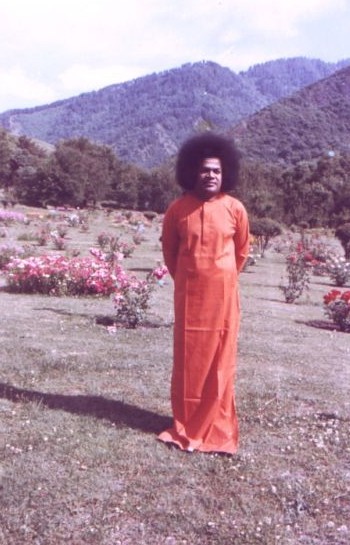
Sai
- The Resident of Your Heart
He wrote to an
old lady whose husband had died in an
accident:
"Marriage
binds two persons together as husband and
wife. What were they to each other minutes
before? The one would not have worried for
the other if the wedding had not happened.
Where was the son or the brother before
conception? Life is an interlude between what
was and what will be. During this interlude
one should not lament over what cannot be
helped or set right, but should seek God and
take refuge in Him. Your husband lived a good
life in the light of the Truth he had
glimpsed. He did no wrong to anyone; he loved
and served the suffering and the illiterate;
he salvaged many families from penury and
infamy; he helped many young people to go
through college; many sick persons were saved
by his timely donations; he was ever cheerful
and spread cheer wherever he went; and, at
last, God willed that he cast away the body
that limited him. Of what use is it now to
calculate what might have happened had he not
gone to Madras that day?
"Your
duty now is to sustain the greatness he
earned, to follow the ideals that he had
placed before himself. Your husband is here,
in My presence, and he will be here forever
as he had wished to be, even when alive.
Swami will not allow him to be separated from
His presence, he is now free from all bonds
and boundaries.
"You
are indeed fortunate that destiny drew you to
him and gave you so many years of loving
companionship with such a fine person. His
thoughts were pure; there was no blemish of
envy, hatred, or greed in him. So his place
is with Me, forever. I am writing this letter
to you in order to shower on you the cool
rain of love. That rain will scotch the
flames of grief that are now raging within
you. Your husband is at Prasanthi Nilayam, in
the presence of Sai, having attained that
climax by his spiritual
aspirations."
The
Gîtâ describes the Lord as the
friend of all beings (sarva bhootha suhrd).
These letters reveal that he is more reassuring
than any father, more affectionate than any
mother, more considerate than any kinsman and
more just than any human authority. The blessing
that Baba confers on lives dedicated to God who
is enshrined within us is, invariably,
everlasting life in Himself.
|Previous
|Next
|
Bhajans
